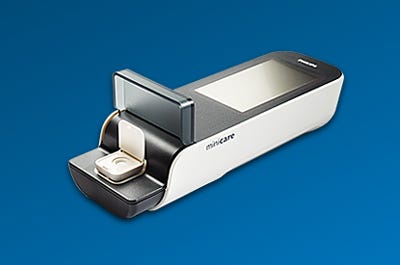May 31, 2016
The Dutch medical device company says the handheld medical device is for rapid point-of-care diagnosis of heart attacks.
Nancy Crotti
|
Philips' Minicare I-20 (Image courtesy of Philips) |
Koninklijke Philips has launched a handheld blood test that it says can cut the time to diagnose a heart attack from one hour to less than 10 minutes.
The Minicare I-20 system measures the level of cardiac troponin I (cTnI), a protein that is excreted by the heart muscle into the blood following a heart attack. The company claims that it delivers on-the-spot test results comparable with those obtained in a laboratory, enabling the physician to decide on treatment without delay.
Philips recently won the a CE Mark for the Minicare I-20, which it has begun selling in the UK, Germany, the Netherlands, and Belgium. The company plans to roll it out elsewhere in Europe. The device is not available in the U.S.
The heart attack application is not the first for the Minicare I-20. In March 2015, announced a multi-year development agreement with Janssen Pharmaceutica N.V. to develop a handheld blood test for use with neuropsychiatric patients.
Each blood test for use with the Minicare device would have dedicated software and a single use, disposable cartridge containing the application-specific test. The technology was designed to detect multiple target molecules at low concentrations within the same blood sample and to show the results on the analyzer display within minutes.
"The commercial launch of the Minicare I-20 system for cardiac troponin I testing represents a major milestone for us," Marcel van Kasteel, CEO of Handheld Diagnostics at Philips, said in a statement. "I am convinced that we will be able to make a real difference for patients and care providers. Minicare I-20 is designed to help care providers reduce both the time-to-treatment and time-to-discharge of patients, thereby helping to reduce crowding in emergency departments and improve the utilization of hospital resources."
It can easily take more than an hour to get the results of a laboratory test back to the physician in a hospital setting, according to Paul Collinson, MD, a consultant chemical pathologist at St George's University Hospitals NHS Foundation Trust in the U.K.
"Point-of-care testing can significantly help to reduce the turnaround time," Collinson said in the statement.
The Minicare I-20 was tested in real-life acute care settings within the European Lab2Go project, a consortium of European hospitals, according to Phillips.
The eighth largest medical device company in the world just held an IPO to spin off its legacy lighting business. The stock offering valued the lighting company at a $3.4 billion market capitalization, according to a report in Fortune.
Nancy Crotti is a contributor to Qmed.
Like what you're reading? Subscribe to our daily e-newsletter.
About the Author(s)
You May Also Like



